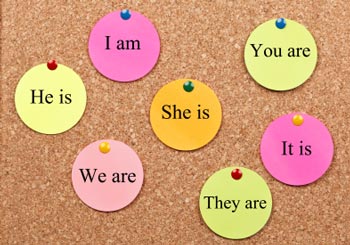The rule is simple: singular subjects take singular verbs and plural subjects take plural verbs.
But sometimes it’s difficult to tell whether a subject is singular or plural. That’s why subject-verb agreement errors crop up in so many pieces of writing.
Making matters worse is the fact that most people don’t know what subject-verb agreement means. In fact, too many people don’t know a subject from a verb.
When you’re fixing up your sentences and making sure they are correct, it helps to know the parts of speech, how to conjugate a verb, and how to diagram a sentence (so you can identify the subject). If you understand all those basic elements of language, then you can easily make sure your subjects and verbs are in agreement.
Parts of Speech: Verbs
Traditionally, there are eight parts of speech: nouns, verbs, adjectives, adverbs, pronouns, prepositions, conjunctions, and interjections. As a writer, you should be able to identify all of these words in any sentence. For our purposes today, we’re only concerned with verbs.
Verbs are action words: write, walk, run, dance, do, be, sit, listen, fidget, and contemplate are just a few verbs in the English language.
Conjugating Verbs
There are two types of verbs: regular verbs and irregular verbs. All verbs get conjugated based on the subject of the sentence, which is the thing or person doing the action. Here’s how the regular verb dance is conjugated:
| Infinitive | dance | |
| Past | danced | |
| Present Participle | dancing | |
| Past Participle | danced | |
| Present | I | dance |
| Present | You | dance |
| Present | He, She, It | dances |
| Present | We | dance |
| Present | You | dance |
| Present | They | dance |
In some languages, there are more variances in regular verb conjugations.
All regular verbs follow this same template for conjugation. Past tense takes -ed, present participle takes -ing, and so on. However, irregular verbs are a little more challenging. Each one has its own unique conjugation system. Let’s take a look at the conjugation for the irregular verb write.
| Infinitive | write | |
| Past | wrote | |
| Present Participle | writing | |
| Past Participle | written | |
| Present | I | write |
| Present | You | write |
| Present | He, She, It | writes |
| Present | We | write |
| Present | You | write |
| Present | They | write |
As you can see, past tense and past participle render wholly new spellings (whereas regular verbs simply tack -ed to the end of the word). Keep in mind that each irregular verb has its own rules of conjugation. For a more elaborate conjugation of the verb write, check out this chart.
Identifying the Subject of a Sentence
Every proper sentence must have a subject and a verb. The most basic example would be I write, which is a complete and correct sentence. As mentioned, the verb is the action word (write). The subject is the word that does the action (I). In the sentence I write, the subject is I because that’s who is doing the writing.
Let’s get a little more elaborate. Take a look at the following sentence:
I write poems.
If I is the subject (doing the action) and write is the verb (the action), then poems is the object, which is receiving the action.
Subject-Verb Agreement
As you can see with the section on conjugation, different verbs will be used in a sentence depending on the subject. You can say I write but you’re not supposed to say I writes or I writing. If you do, then your subject and verb do not agree. You can say She writes books, but you can’t say She write books or She writed books.
We don’t see a lot of mistakes with basic subject-verb agreement. In fact, such mistakes are rare for native English speakers. Kids and people who are learning English often have trouble with subject-verb agreement. And these mistakes aren’t limited to English. I made plenty of errors with subject-verb agreement as a teenager learning French. It’s especially problematic when irregular verbs are involved.
Easy as it seems, there are common mistakes in subject-verb agreement. Which sentence below is correct?
1. Each of the students write a book.
2. Each of the students writes a book.
If you guessed sentence number two, you guessed correctly. The following subjects all use the singular verb form: each, everyone, everybody, nobody and someone.
What about compound subjects? Which sentence below is correct?
1. My niece and nephew dance.
2. My niece and nephew dances.
The correct sentence is number one. An easy way to remember this is to replace the subject with a pronoun. In this case, “niece and nephew” would be replaced with they: They dance.
The words either and neither present an interesting challenge. Only one of the following sentences is correct:
1. Either my sister or my brother write.
2. Neither my sister nor my brother writes.
Number two is correct. With either and neither, we use the singular form of the verb. Unless one of the subjects is plural:
1. Either my sister or her friends dance.
2. Neither my sister nor her friends dances.
In this special case, the subject closest to the verb decides whether the verb is singular or plural. Since friends is plural, we use the plural form of dance. In this case, we replace “friends” with they to get They dance. The correct sentence is number one.
Final Challenge
As you write, you will inevitably come across puzzling constructions involving subject-verb agreement. Here’s one last challenge for you to consider:
1. The team had a meeting. They decided to extend the deadline.
2. The team had a meeting. It decided to extend the deadline.
3. The team members had a meeting. They decided to extend the deadline.
How many of these sentences are correct?






Let me guess. 2 and 3 are correct, even though 1 sounds better than 2 to me.
How about when we have either/or, neither/nor while both subjects are plural?
Either my sisters or her friends dance.
Neither my sisters nor her friends dances.
You got it!
With your example, we’d apply the rule about using the subject closest to the verb (it really doesn’t matter whether the other subject is plural or not), so it would be number one 😉
Hi, not been around for a while and got a chance to visit again today. What a great post. I agree, you’d be surprised how many people strucggle with the basics.
Hey, it’s good to see you! I get the sense that a lot of people understand rudimentary grammar rules, but it’s more through their life experience with speaking and writing a language than knowing the actual rules. The problem is that when special circumstances crop up, we need to know the rules and apply them; otherwise we’re flying blind.
It appears that this is one of my biggest issues, when concerning writing. I’ve forgotten half of the stuff I learned in school, when I was younger; or maybe, I never knew them. When Melissa wrote out the eight parts of speech, I was lost after pronouns(and I just recently learned what they are). Not a clue of what prepositions, conjuctions, and interjections are; at least I can not recall what they are. Is there a course that would re-introduce all of this to me once again? I am in college.
When I was a kid, I don’t think I had any resources on hand that I could use to look up the parts of speech. These days, you can easily do an online search to find out more about the parts of speech in just a few minutes. In the old days, it required a trek to the library, digging through card catalogs, perusing the aisles, and flipping through countless books. I would say you’re lucky in that you can find out more about those parts of speech you don’t know with just a few clicks.
I don’t think I truly understood the nuts and bolts of the English language until I began studying Spanish in high school. Then it was like a lightning bolt!
I know what you mean. When I studied French, I began to see English in a whole new light!
In the UK, 1 and 3 would be considered correct:
1. The company had a meeting. They decided to extend the deadline.
2. The company had a meeting. It decided to extend the deadline.
3. The company employees had a meeting. They decided to extend the deadline.
Read a few British articles about business and you’ll be struck when they use phrases like, “Exxon are paying a big fine”, or “BA are adding new flights from Heathrow.”
Interesting. I wonder if in the coming years, British and American English will merge because of the Internet.
Great article – am going to share it on my Facebook page!
Suzan St Maur.
Thank you so much, Suzan.